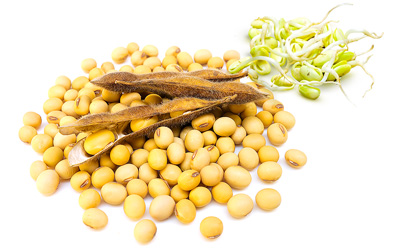Soy is mainly known for its beans, which have long delighted health-minded communities with their high protein content and phytoestrogens.1 What's less known, however, is that soy leaves also contain medicinal compounds.
A study published in the Nutrients journal revealed the myriad of beneficial effects of soy leaf extract, rich in a type of isoflavonoid derivatives called pterocarpans. It has been previously shown to reduce insulin sensitivity in rats with type 2 diabetes.
The Study
50 overweight or obese Korean adults with metabolic syndrome participated in this study. They were randomly divided into two groups: half took a pterocarpan-rich soy leaf, and the other half took a placebo made of starch every day for 12 weeks.
Researchers took blood samples at the beginning of the study and every four weeks after that. They measured the participants' waist and hip circumference, blood pressure, fasting blood sugar levels, and lipid levels.
They also measured levels of glycohemoglobin (a form of hemoglobin linked to glucose), which helped determine average blood sugar levels over the three months prior to when the samples were taken.
The Results
While the soy leaf extract did not impact weight or BMI, it decreased total cholesterol as well as the levels of blood sugar, lipids, and glycohemoglobin, compared to the placebo group.
It also lowered insulin resistance and reduced the expression of genes related to inflammation.
What Does This Mean?
The study showed that a two-gram soybean leaf extract taken daily can reduce several risk factors for diabetes in overweight people who are already showing signs of metabolic syndrome.
This builds on the body of research that has already demonstrated the anti-diabetic effects of pterocarpans, solidifying the notion that soy leaf extract is a potent tool in the management and prevention of type 2 diabetes. Of particular interest, the fact that the pterocarpans also lowered glycated hemoglobin levels means that they can regulate blood sugar levels long-term.
This study was on the small side and only involved overweight patients, so pterocarpans may not have the same beneficial effects in people with a lower BMI. Nonetheless, the results were very favorable in the population studied, supporting the impetus for further research and, potentially, a more universal use of soy leaf extract for diabetes prevention and control.
As a preventative and alternative measure, it is recommended to follow a healthy life style and a balanced diet that includes foods like alfalfa, avocado, cherimoya, and dragon fruit, all of which are great for keeping cholesterol levels and other metabolic markers at bay.
Sources
- Nutrients, Beneficial Effects of Pterocarpan-High Soybean Leaf Extract on Metabolic Syndrome in Overweight and Obese Korean Subjects: Randomized Controlled Trial, 2016
Footnotes:
- Harvard T. H. Chan. (n.d.). Straight Talk About Soy. Retrieved November 11, 2020 from https://www.hsph.harvard.edu/nutritionsource/soy/





